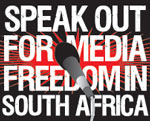
Top stories






LifestyleWhen to stop Googling and call the vet: Expert advice on pet allergies from dotsure.co.za
dotsure.co.za 2 days
More news

















Duncan (@DuncanJane), a former Freedom of Expression Institute director, was reacting to the meeting held on Friday 24 June between the government and the leadership of editors' body (SANEF), during which the two 'sworn enemies' pledged to respect each other and take steps to improve their relations.
"Both government communicators and the media should treat each other with respect and dignity as professionals, and should continue to work together to inform and educate the nation," the Presidency said in a statement issued on Friday afternoon.
Sceptical
But, a sceptical Duncan said relations will only improve once the ruling ANC stops its assault against the media on so many fronts.
"The government must distance itself from Manyi's dangerous statements about using government advertising to reward media sycophants and punish media critics," she said.
"The concessions made by the ANC on the Protection of Information Bill [aka [Secrecy Bill] will go some way to mending fences, but it should be noted that the bill still presents huge obstacles to journalists wishing to report on the security cluster, and for ordinary citizens wishing to hold this increasingly powerful part of government to account.
"So much more needs to be done on the bill. The ANC also needs to drop its intention to establish a statutory media appeals tribunal (MAT). Only then can we talk about a more productive working relationship between government and the media," Duncan pointed out.
Manyi still very much the 'darling'
Despite sowing what some observers see as 'dangerous seeds of division, conflict and provocation', Manyi is still very much the 'darling' of the ANC-led government, which continues to support him, come rain or shine. The ANC Youth League last week threw its full support behind Manyi, slamming the media for 'spreading lies'.
The Pretoria meeting, held between minister in the presidency Collins Chabane and SANEF, further agreed that there should be continued discussion between the government and the media to resolve any issues of concern, but also continue to interact on issues of national and international interest.
Chabane reassured SANEF that it was not government policy to use government advertising to interfere with editorial independence of media.
However, critics who vividly remember the mines nationalisation saga - vociferously promoted by ANCYL president Julius Malema, refuted by the ANC but ending up being on the National General Council agenda in Durban last year - are still not convinced.
Part of a much bigger plan
Some insiders suspect Manyi's threat to starve anti-government publications of state advertising [which last week he denied saying - managing ed] is part of a much bigger plan by the ANC-led government to prove who is the boss, and force critical media to beg for mercy.
Asked what exactly the government could be plotting, Duncan explained: "There are two currents of thought within the ANC about the media, which date back to pre-1994 elections. The first current of thought, influenced by the Stalinist legacy of the South African Communist Party (SACP), appears to consider control of the media as being necessary to achieve developmental objectives. The second current of thought, influenced by both liberal and social democratic philosophies, considers the media freedom to be a condition of development.
"Many in the Stalinist and social democratic currents of thought consider media concentration and commercialisation to be a threat to democracy, but the latter differs from the former in that the latter does not believe that a genuinely diverse media can be achieved through state direction of media content.
"What we are seeing at the moment is a contest within the ANC between the two streams of thought: hence the flip-floppery on the Protection of Information Bill. "We are likely to see similar flip-floppery in relation to the MAT as well. It is important to recognise that the ANC is a broad church, and is contested.
"Fight is often bitter, lonely and even dangerous"
"There are many democrats who are fighting against the rise of authoritarian tendencies in the party and in government generally, and they need to be supported, as this fight is often bitter, lonely and even dangerous.
"The danger for South Africa as a whole, though, is that the first current of thought may come to assume prominence in the ANC's thinking, given the global shift towards authoritarian rule with the rise of China as a global power, as well as the growing power of the securocrats in government thinking, both in countries like the US and the UK, and increasingly in SA."
She said if this happens the country could see the growing intolerance towards the media becoming entrenched in policy. "Then we will have a real problem on our hands," she concluded.
For more:
